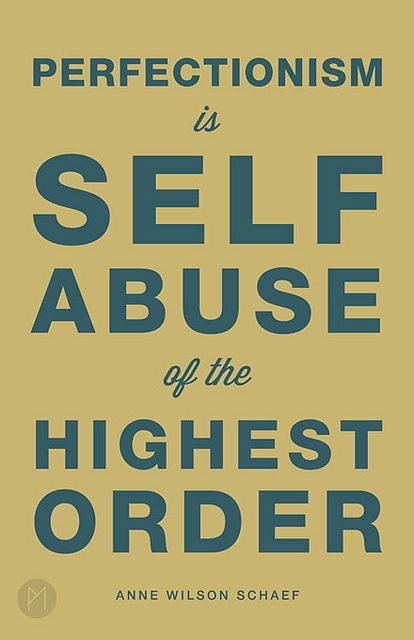
The second guidepost outlined By Brené Brown in her work is Cultivating Self-Compassion: Letting Go of Perfectionism.
Perfectionism in itself is a topic I could write about for a year and still have more to write. It is the culprit that underpins many unhealthy behaviours and is a common by-product of ‘I am NOT enough’.
Letting go of Perfectionism is critical to embrace greater levels of self-compassion. Dr Brown explains very clearly that perfectionism is not the same as healthy striving for excellence, she believes it is an addiction that stifles everything we do and it’s very much handed down through the generations. The simplest way to tell whether you are being perfectionistic or just striving for excellence is to identify where the driver for that behaviour is coming from – is it external? i.e. are you wanting to get it right to impress others or to avoid perceived consequences from others? If so this is perfectionism. Is the driver internal? Is it a force coming from within you driving you to do the very best you can? If so this is likely to be striving for excellence.
I know from my experience that I feel very differently when I am being perfectionistic rather than striving for excellence. The burden of being perfect is heavy, feeling like I will be judged or graded for my performance and always feeling like I need to do just that little bit more (often at the expense of even finishing something).
When I am doing something for myself, for my own sense of achievement and growth I rarely think about what others may say or how they may react – I am less focused on their expectations and detached from their opinions. I still value feedback and complements of course (!) but I don’t take things to heart nor do I rely on their approval to validate what I have done.
Given it’s insidious nature it may surprise us to know how rife perfectionism really is. Perfectionism is a self-protection strategy many of us have chosen to use to avoid feeling shame. Dr Brown calls it a ‘twenty ton shield’ and describes it as a well-worn and common defence mechanism. Sadly, perfectionism doesn’t work, it continues to drive us into the ground, wearing us down, while tricking us into believing we are doing the right thing. No matter how hard we try, it doesn’t give us the one thing we are yearning for, the feeling of being ‘enough’. Perfectionism wins every time and keeps us hooked with the belief that if we can just do it better next time or do more next time or be faster, stronger, thinner, smarter or whatever relates to that situation, we will be enough.
The best people and businesses have healthy doses of mistakes and failures, this is how we learn best. Perfectionism doesn’t allow for mistakes and it is an exhausting and debilitating way to operate.
The good news is that it is ‘curable’! As a recovering perfectionist I can see the damage it has done to myself and others that I have coached. One of the greatest ways to eliminate perfectionism is to focus on building up our ‘self-compassion’ muscle and before we move on to this take time to reflect on a few questions:
Do you have a tendency to be perfectionistic?
In what areas of your life does it show up?
How has this disadvantaged you?
What would be different for you if you simply stopped?
What support do you need in place to consider this?
I am a big fan (borderline groupie actually) of self-compassion. For me it has become a staple ingredient in my emotional health diet. It provides sustenance for any challenge I am about to face and it is essential in the recovery phase too.
Self-compassion isn’t self-indulgence – it is a necessary act of self-care. Self-compassion is quite simply treating ourselves as we would treat someone we care deeply for, with love, patience, understanding and respect.
When someone we care about is struggling we do everything on our power to support them, show we care, help them but we rarely take the time to do this for ourselves when we are in a similar situation instead we criticise ourselves, judge ourselves and often make ourselves work harder.
Dr Brown often refers to the work of Dr Kristin Neff from www.self-compassion.org. Dr Neff’s website provides many valuable free resources to assess your own level of self-compassion and gives guidance on how to increase it. Dr Neff describes the three elements of self-compassion as:
- Being kind to ourselves: treating ourselves as we would someone we love;
- common humanity: understanding that we are a part of something bigger and others have shared the difficulties we are facing (we are not alone); and
- mindfulness: being present to how we are feeling, acknowledging it and accepting it as OK.
 When in emotional discomfort, Dr Neff suggests we take a few minutes to practice Self-compassion by stopping and acknowledging these three things by saying something like “I am having a tough time right now, I know that others have felt this and I am not alone, I am OK”. This simple process brings us into the present moment to respect where we are and acknowledge our needs and feelings.
When in emotional discomfort, Dr Neff suggests we take a few minutes to practice Self-compassion by stopping and acknowledging these three things by saying something like “I am having a tough time right now, I know that others have felt this and I am not alone, I am OK”. This simple process brings us into the present moment to respect where we are and acknowledge our needs and feelings.
Self-compassion doesn’t allow for perfectionism, they can’t co-exist. Consider how you can integrate even a little self-compassion into your day and watch how quickly things change for you. I am not suggesting you take yourself off for a pamper session at your local spa each day, unless that floats your boat, but rather, focus on changing a few small things that will have a big impact. Even saying “I’m doing the best I can” instead of “I’m useless” will have a positive effect on how you feel. Just give yourself a break.
This month consider how you can introduce even a little self-compassion into your day. We are all capable of being compassionate toward others so it isn’t something we need to learn, we simply need to direct it toward ourselves.
Until next month




